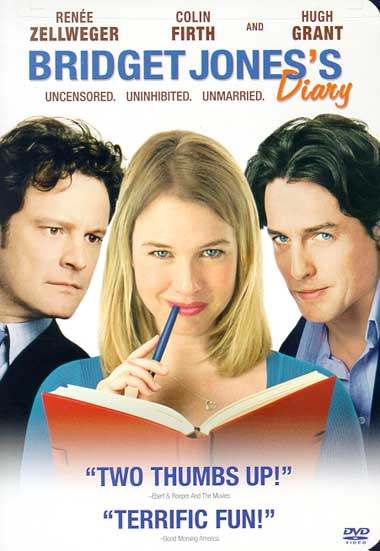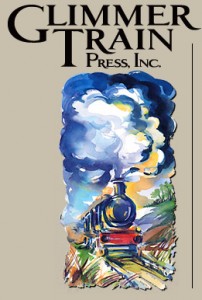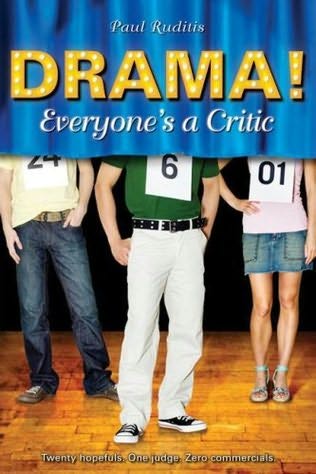Glimmer Stain
Glimmer Train used to be a decent, if not rather traditional literary magazine but in recent years, they’ve really pushed the limits of credibility running contests every single month. To my mind, a contest is only meaningful if it is the exception rather than the rule. Winning one of their ubiquitous contests is like winning $2 on a $2 scratch ticket or a free small soda during McDonald’s Monopoly promotion. Their newest contest, for the Best Start to a story, quickly prompted an appropriate amount of ridicule and yet we all know people will continue to submit their stories and entry fees ($10-$20 per entry) to Glimmer Train in the fairly futile hope that it means something. At what point do we concede that Glimmer Train has become a vanity press?
Grammar Lesson: Bridget Jones’s Diary

For my first contribution to Mean Week, I want to address something that bugs the living hell out of me: when attributing singular possessive nouns ending in the letter -s-, nothing changes from the way in which you attribute singular possessive nouns ending in other letters. Just add an apostrophe -s-. That is all. Don’t change anything or do anything differently. This is very, very simple.
For example:
Philip Roth’s novels are boring as fuck.
Ben Marcus’s novels are fun.
You see how I did that?
I did not write: Ben Marcus’ novels are fun.
[Because that doesn’t make any sense – Ben Marcus is one dude, not plural dudes.]
I also did not write: Ben Marcu’s novels are fun.
[Because that makes no sense. His name is Marcus, not Marcu.]
Not sure why so many people are incapable of understanding this simple punctuation, but I notice these mistakes occurring all the time — and it drives me bonkers!
Explain Mean Week Yourself! Sean Lovelace or Ander Monson
 What? This is the stupidest thing I’ve ever seen.
What? This is the stupidest thing I’ve ever seen.
I’m sorry Sean Lovelace or Ander Monson (whoever really gets the credit), but you can’t use Amazon to host a literary magazine.
Please remove your stupid journal immediately. There is no editorial control. People are just writing all willy-nilly. It’s been around for more than seven months and someone submitted as recently as two hours ago. It should have died by now.
Meanwhile, my story was posted in the beginning and only 3 people found it useful.
This is exactly what’s wrong with indie lit. No one can read my story because too many other people are writing and all the editors are freaking crazy.
Dammit.
Repeating the same thing over and over in social networks and blanket emailing my inbox is never going to make me want to buy a book. In fact, it might make me want to not buy a book. Try something else. Or better yet: just exist.
Against Transparency

It’s become a pretty popular complaint here and elsewhere: writers getting upset because there’s a literary magazine or journal who isn’t being up front about who they are and how they work. The primary complaint seems centered around the idea that editors should make themselves known to their potential writers and readers, so as to supposedly more clearly define the way the selection of work goes down, as well as lend some manner of culpability to the ramifications thereafter. As in, an editor can’t be a cock in a rejection letter, or have a real big backlog of responses waiting, without the attached weight that this will then affect their ‘reputation’ in the community. This is supposed to, I think people think, clean up on the editorial end any possible wrongdoing or ill treatment. When editors don’t do this, certain types like to claim they are “hiding behind” something, or otherwise somehow not operating on some kind of common ground of lit creation.
Who gives a fuck?
Top 5 MFA rankings rearranged
People are moaning about Poets & Writers’ “2010 MFA Rankings: The Top Fifty,” a list of the best MFA programs in creative writing based on likely variables such as funding, selectivity, and postgraduate placement. Though we are in the business of words, let us rank the Top 5 programs solely based off their website’s front page banner pictures, since they are to represent academic ethos, or something.
—

1. University of Iowa in Iowa City University of Virginia, Charlottesville
Any MFA program that would show a student on their hands and knees writing ‘retard style’ on the cement deserves to be re-ranked to No. 1. If they can’t afford desks, a press release on the subject would not be uncalled for. Notice the open notebook, as this student is probably transcribing some contemporary haiku: Raithins yah I like / Peanuths and cashthews too / my shopping lisp. The autumnal detritus of fallen leaves is a nice touch. Gravity, while inevitable, gives the uncreative something to write about.
People Blurbed HTMLGIANT

I’ve tried to collect from the internet as many ‘blurbs’ as possible over the course of this past year, and I’d like to share a few of them with you here to celebrate our having survived twelve months of being the internet literature magazine blog of the future. The blurbs are real, in that I copied and pasted them from comments and other websites, but I have dropped the names of the blurbers in order to protect the innocent. So, thanks for reading us, hating us, loving us, shittalking us, and supporting us.
“Exactly equivalent to writing on a bathroom wall, and shame on you. Talk about ‘slime balls.’ Slime ball indeed.”
~ Richard Bausch“I’ve come to realize that HTMLGIANT contributors are, in large part, idiots.”
~ Jerzy Kosinski“I think HTMLGIANT is still trying to find their voice. They seem to teeter between adolescent posturing and intelligent discussion.”
~ Oprah Winfrey
Glimmer Train’s Best Start
 The more creative editors get, the less writers have to. I’ve noticed a lot of send this type of thing in submission guidelines, which can be effective when applied as a formal constraint, but it seems, with the exponential increase of content everywhere, that we (as writers and editors) grow less and less concerned with writing than we are with creative publishing. Editors, who may be themselves writers, are more and more conceptually proactive, and no longer just “edit” in a subtractive sense, but impose an editorial narrative on the aggregate of work they publish. This can be, and is often exciting, but sometimes just, um.
The more creative editors get, the less writers have to. I’ve noticed a lot of send this type of thing in submission guidelines, which can be effective when applied as a formal constraint, but it seems, with the exponential increase of content everywhere, that we (as writers and editors) grow less and less concerned with writing than we are with creative publishing. Editors, who may be themselves writers, are more and more conceptually proactive, and no longer just “edit” in a subtractive sense, but impose an editorial narrative on the aggregate of work they publish. This can be, and is often exciting, but sometimes just, um.
Of their “Best Start” fiction category: “[…] is different from our others in that the piece should be an engaging and coherent narrative, but it does not need to be a complete story […]”
And you thought flash fiction was the easiest way to write, now you don’t even need to finish a story. They then go on to say, “All pieces should be original fiction and not have appeared in a print publication.” If the piece is unfinished, how the hell would it have appeared elsewhere? Then they say, “No fiction for children, please.”
Reviewing the Amazon Reviewers: I know this book has the word “Apocalypse” in the title, but that doesn’t mean it’s going to be shitty sci-fi (even the sci-fi in it is really good) so if all you want in life is shitty sci-fi, do us both a favor and buy a different book.
 The Apocalypse Reader just got its 8th review on Amazon the other day. One Michael J. Mason of Orlando, Florida, wrote a review entitled “The only book I have ever disliked so much that I destroyed it!” Wow. Okay, well, I can take my lumps. Democracy is great, blah blah. In fact to be totally honest, there was something about the sheer vehemence of this headline that got me really, really excited. As Jesus puts it in the Good King James: “So then because thou art lukewarm, and neither cold nor hot, I will spue thee out of my mouth.” (Rev. 3:16.) This guy seemed like he was fixing to boil. Oh boy!
The Apocalypse Reader just got its 8th review on Amazon the other day. One Michael J. Mason of Orlando, Florida, wrote a review entitled “The only book I have ever disliked so much that I destroyed it!” Wow. Okay, well, I can take my lumps. Democracy is great, blah blah. In fact to be totally honest, there was something about the sheer vehemence of this headline that got me really, really excited. As Jesus puts it in the Good King James: “So then because thou art lukewarm, and neither cold nor hot, I will spue thee out of my mouth.” (Rev. 3:16.) This guy seemed like he was fixing to boil. Oh boy!
But as I read MJM’s complaint, my heart sank. Turns out he was just another lukewarm asshole, who talked big in his headline but couldn’t sustain his concentration long enough–over the course of his one-paragraph review–to (A) actually describe for us the manner in which he destroyed the book, which would have been interesting, or (B) realize that that sound of one hand clapping was actually me hitting myself in the fucking head, because despite all his bluster and bullshit, he actually liked some estimable (albeit unspecified) percentage of what he read. I’m the last person to bristle at negative reviews, but it drives me insane when people take to a public forum and attack something they didn’t like, not because there was anything wrong with the thing itself, but because the thing itself wasn’t what they wanted. Imagine giving a 1-star review to a portable hard drive because it’s not a dishwasher. Now one of the things I’m proudest of about The Apocalypse Reader is that it happily blurs/ignores/defies the boundaries between genre-lit and mainstream-lit, in the name of Good Lit, period. But the price the book has paid is that it has been consistently plagued by incensed genre-monkeys, for whom I don’t doubt experimental literature (or literature, period) begins (and ends) with Terry Pratchett. (And at the risk of re-starting the Genre Wars that raged recently on this site, I’d like to point out the total number of “literary elitists” who have written in complaining about the book’s genre quotient is ZERO.)
September 4th, 2009 / 10:51 am

 George Carlin has
George Carlin has